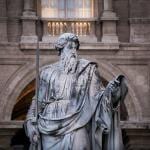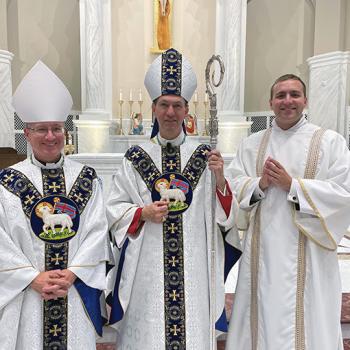Every Easter we celebrate the resurrection of Christ. It is the foundation of our faith, and without the resurrection are faith is futile (1 Corinthians 15:14). Beyond proving that Jesus is the Christ, what does the resurrection prove? The resurrection is about much more than the eyewitness accounts of the Apostles seeing the risen Jesus. It is also about the new life that is present in every believer throughout time.
Resurrection Brings Transformation
We have finite minds, and it is hard for us to grasp the miracle that is the resurrection. Jesus is a divine being, and as a divine being he resurrected from the dead to prove who he was. Though theologically true, this view leads to a somewhat simplistic understanding of the event.
The resurrection can also be seen in the transformation of the believer. It is about the new life in Christ and not what the ocular vision of the disciples has perceived. Saint Paul also echo this sentiment in 2 Corinthians 5:17, “So if anyone is in Christ, there is a new creation: everything old has passed away; see, everything has become new” (NRSV).

As Believers We Share In It
The resurrection is a religious experience of one who has come to faith in Christ, and is much more than something that happened to those who physically encountered the risen Christ. According to Scholars such as Luke Johnson this is a common theme in the Pauline Corpus.
Regarding this Dr. Johnson writes, “The resurrection experience, in Paul’s letters, is not something that happens to Jesus alone” (Johnson 25). Every Christian with a genuine faith in Christ experiences the resurrection in a special way through baptism. Through the sacrament of baptism original sin is wiped away, and we are raised in the newness of life.
People Don’t Die For Something They Don’t Really Believe
Within the context of introducing the resurrection to Christian audience there are a couple of things to keep in mind. From an apologetics standpoint, it is important to know the reasoning as to why the resurrection is the foundation of the faith. One can go into the martyrdom of the early church because they were attesting to the resurrection. People do not die for a lie.
Along those lines it is important to understand that the resurrection actually happened. It has become popular in some circles, both Christians and skeptics, to say that the resurrection account was a times of altered state of consciousness.
It Really Happened And Was Not An Altered State
If this were one person then perhaps, but in a way Saint Paul challenges this. In 1 Corinthians 15 he challenges people to go and ask some of the 500 witnesses to the resurrection to whether it happened or not. The resurrection happened, it is real, and is the foundation of Christianity. No literal bodily resurrection means Christianity was founded on a lie, but there is no body. Regarding the literalness of the resurrection Fr. Kenneth Baker writes,
“This is indeed a shocking statement. It signifies something that we have never experienced but must accept solely on faith because of the testimony of the Apostles, for the Apostles were the chief witnesses of the Resurrection”.
This description of the resurrection is quite different from what an altered state describes. Merriam-Webster defines it as,
“any of various states of awareness (as dreaming sleep, a drug-induced hallucinogenic state, or a trance) that deviate from and are usually clearly demarcated from ordinary waking consciousness”.
Describing the resurrection as something the disciples experiences in an altered state is a slippery slope. St. Paul states that the reality of the resurrection is what our faith rests on. Without it we are still dead in sin.
![]()
The Resurrection Is Also Personal
Secondly, it is more important to assist the audience in learning to relate to the resurrection in a deeper way. A way that is more personal, and something that they can share. Everyone has something deep in the recesses of their mind that they are ashamed of. It may be an addiction, adultery, or a gambling problem. These things are destructive, but when one comes to faith those things are in the past. They still may struggle, but through Christ they are resurrected and forgiven for those things that they have done. Those types of experiences are the modern-day equivalent of the disciples physically seeing the resurrected Jesus. Our former selves are dead and gone, but we were resurrected spiritually into a new creation. The disciples’ experience of Jesus raised and exalted is the difference between their faith in the gospel.
Saint Quotes On The Resurrection
“[W]hoever perverts the sayings of the Lord for his own desires, and says that there is neither resurrection nor judgment, such a one is the firstborn of Satan. Let us, therefore, leave the foolishness and the false-teaching of the crowd and turn back to the word which was delivered to us in the beginning” (Letter to the Philippians 7:1–2 [A.D. 135]).-St. Polycarp
Works Cited
Holy Bible, New Revised Standard Version
Johnson, Luke Timothy. “How Jesus Became God” Commonweal. 2/3/2015. Web. 22 Feb. 2015.













